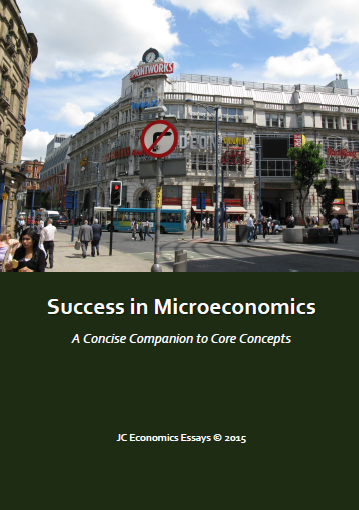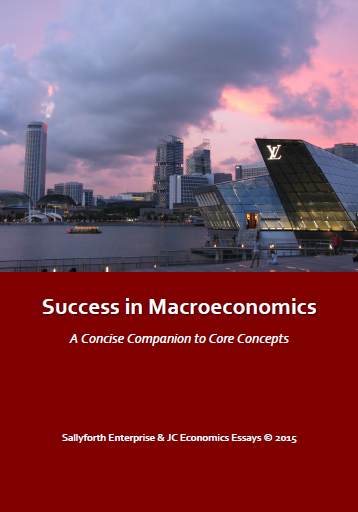Many economics students want to know the secrets of how to do well for economics case studies. This is true whether they are in Junior College, high school, or even in universities.
This post examines five simple tips on how students can succeed in their A level economics case studies. Understanding these strategies will give you a real edge in effectively responding to case study questions.
What are some strategies and tactics that can effectively tackle or answer economics case studies?
Many economics teachers and tutors claim to have simple steps to scoring in A level economics case studies, especially since A level (whether it is H1, H2, H3 or A/AS) Economics has a strong emphasis on applications to the real world.
Sometimes these economics teachers' methods work, and sometimes these methods do not. Some methods are detailed, while others are mere gimmicks. In this vein, case studies become something to be gamed and attacked, rather than a real or true learning experience (a formative assessment).
What would be more important for students would be a real understanding of how to excel in case studies as an assessment. With that in mind, this post gives students real tips on how to really excel in economics case studies.
The first tip is – really, really, really know your economics.
Have you really learnt and mastered your economics material? The reality is that case studies are not comprehension passages that ask you to find some information, but require you to have a strong grounding in theory. Studying hard for economics will really provide you with a strong theoretical background to answer case studies properly. Students who just repeat what is in the extracts or sources do not score as well as students who have integrated and internalised their knowledge.
The second tip is to answer the question posed, as the question is - and not what you imagine the question to be.
If the economics question asks for an explanation using examples, it is not the same as explaining economics using pure theory. If the question asks for an answer from a particular source, use that source in your response or answer. If the question asks for a "comparison", it is not the same as an "evaluation". What is the command phrase being used? Pay attention to the key command phrases - what is it that the examiner wants you to do? If you do what the economics examiners want, they will reward you with an excellent economics grade.
The third tip is to get comfortable with data-handling skills (both statistical and textual knowledge).
Can you read economic charts and diagrams, examine tables critically, and understand figures? I know at first glance this might appear to be a challenging and herculean task, but with constant practice comes competence. Anyone can get better and better at understanding charts, diagrams, tables, and figures.
Put some effort into understanding economic data, like GDP, unemployment, economic growth, inflation, and balance of payments figures. Try to take active steps to understand what you are looking at. What is the context? What is the economic story? What is being said factually? What is the underlying economic theory? What economic theory can I use to understand this real world phenomenon? What additional economic knowledge can bring to bear to understand the data?
The fourth tip is to always use appropriate and relevant diagrams to help elaborate your economic analysis.
A level Economics case studies are not really that different from economics essay questions. They can be thought of as mini-essays, or short economics essays.
Think of economics case study questions as requests for responses (in essay form), especially for questions which are more than 4 or 5 marks.
In an economics essay, you should use economics diagrams. Therefore, in a case study context you should also use appropriate and relevant economics diagrams to illustrate your point. This would give you an edge over other economics students.
The fifth tip is to always watch the mark allocation.
It amazes me that sometimes economics students write a whole page for a 2 or 4 mark question, yet they write half a page or one whole page for a 8 or 10 mark question. Does this strategy make sense?
The fewer the marks, the more to the point the answer should be. The fewer the marks, the more direct the response required. In other words, do not write the same level of detail for all your responses. Balance your time, effort, energy, and brainpower by the amount of marks allocated. Economics tutors and teachers often focus students' attention on time management - I say that mark management is also important, if not even more important.
Write more, explain more, elaborate more, and evaluate more for higher mark questions - it is the same strategy as an economics essay.
To recap: to succeed in economics case studies, always remember and practise the five tips you have learnt:
Really know your economics.
Answer the question.
Get prepared for data handling.
Use economic diagrams in your mini-essays.
Watch the mark allocation.
All the best for your economics case studies.
Thank you for reading, and cheers!
JC Economics Essays - In this post here on my economics essays blog, we discuss strategic tips on how to address and respond effectively to economics case studies for H1, H2, and H3 'A' Level Economics and also for economics examinations which have case studies as part of the assessment. This post would be useful for examination preparation and economics training.
All ideas and opinions expressed are the editor's own ideas and opinions.
Thank you for reading, and cheers.



